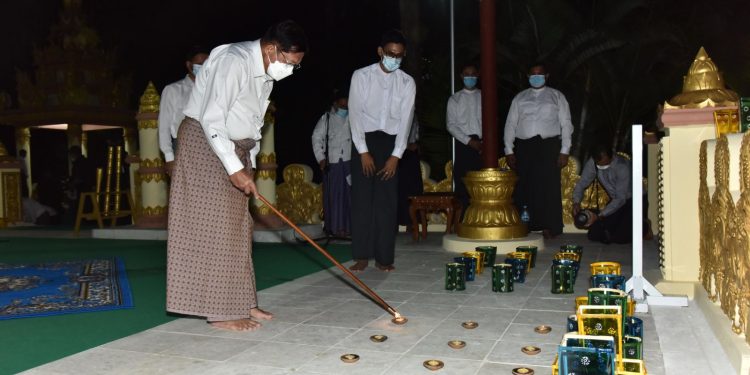Strike-hit regime advertises thousands of jobs
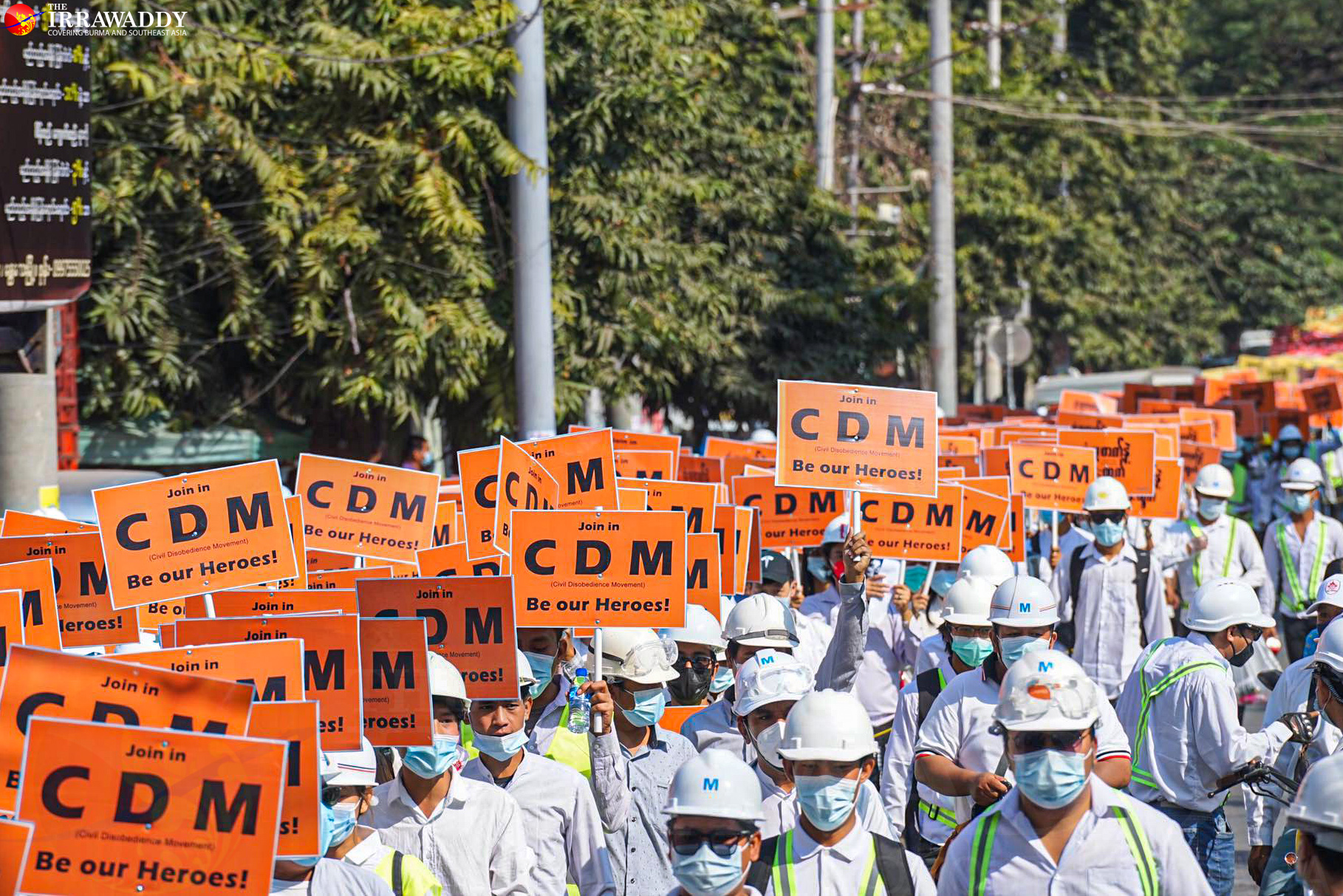
The junta has advertised around 4,000 job openings for its departments in less than six weeks since the beginning of October—a sign that the mass strike by civil servants is still exerting a huge impact, and that the regime is still struggling to run its administrative mechanism including education and healthcare services.
More than 3,000 job vacancies were advertised in junta-controlled newspapers in October, and 900 more were listed into the second week of November. According to the job advertisements, ministries that were recruiting included Science and Technology; Labor; Natural Resources and Environmental Conservation; Home Affairs; and Planning and Finance.
Others included the Health, Education, and Rail Transport ministries, whose employees came out on strike in the aftermath of the coup and joined en masse the Civil Disobedience Movement (CDM). More than 500 vacancies were advertised for the Health Ministry alone.
The job ads list education requirements ranging from a primary education to a university degree. The regime is also reportedly planning to recruit hundreds more for other departments.
The mass strike of civil servants played an important part in Myanmar’s Spring Revolution against the military junta in the wake of the coup. More than 200,000 employees from various government departments joined the CDM. It was a slap in the face for the Myanmar military regime, which has tried various means to force strikers back to work. Its tactics have included threatening with dismissal, issuing arrest warrants, blacklisting strikers for overseas travel, sealing off their houses, detention and prosecution, revoking their citizenship, and taking their relatives hostage.
On Oct. 29, the regime arrested five striking health workers in Mandalay.
Min Aung Hlaing continues ‘yadaya’ in hopes of lasting rule
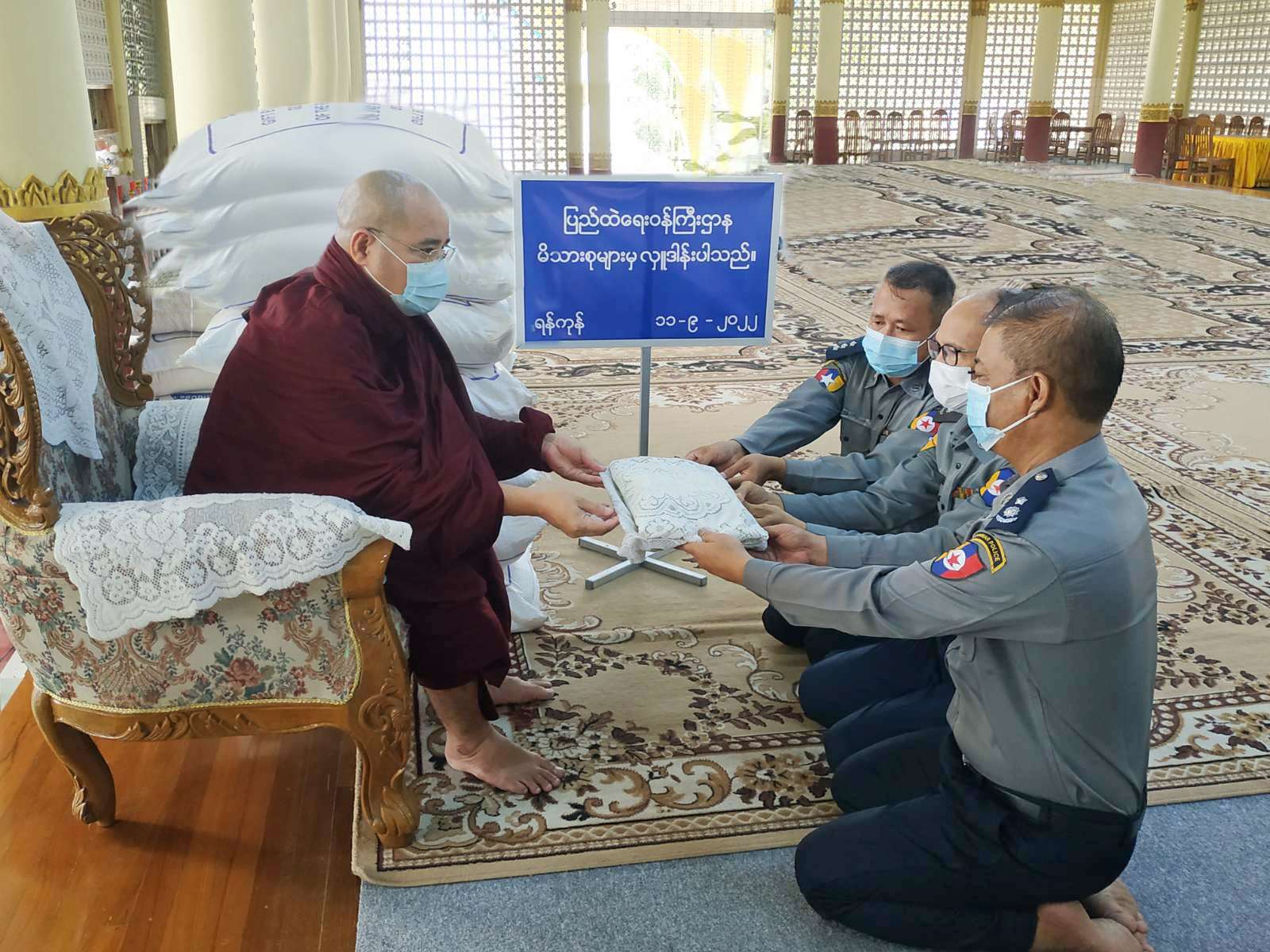
The continuous donation of rice vermicelli—known in Burmese as san kyarsan—by the junta’s Home Affairs Ministry since October has cast a spotlight on the superstitiousness of junta chief Min Aung Hlaing who, like his predecessor military dictators, strongly believes in yadaya, or the Burmese form of voodoo.
It is an open secret that Myanmar’s military leaders believe deeply in various superstitions—astrology, occultism, numerology, black magic, yadaya. Min Aung Hlaing is no exception.
The regime has been donating rice vermicelli to Buddhist monasteries across the country every day, and junta-controlled newspapers faithfully report the donations.
The gifting of san kyarsan, whose name can be literally translated as “enjoying good things for long”, is believed by yadaya adherents to ensure long rule for the donor—in this case, Min Aung Hlaing.
In February 2020, nine months ahead of the general election in November that year, Min Aung Hlaing placed a hti (umbrella) atop the Htilominlo Pagoda, an ancient pagoda in Bagan, seeking divine blessings. Htilominlo means “asking for the umbrella and kingship”. The hti is one of the five royal regalia of Burmese monarchs and represents sovereignty.
It is the very Buddhist temple where successive Myanmar kings paid homage and made donations in the belief that their offerings would earn them favors from the guardian spirits and their reigns would last a long time. It is an open secret that Min Aung Hlaing wants to be the president of Myanmar.
Following the coup, he forced farmers to grow hundreds of thousands of sunflowers, citing the need for cooking oil. In Burmese, sunflower is nay kyar, and the move was done in the hope of “staying long in your position of power”.
Since the early days of the anti-regime protests last year, some women have taken to sticking photos of Min Aung Hlaing to htamein (women’s sarongs) and sanitary pads to spook the superstitious coup leader, playing on a conventional belief that deems it bad luck for men to walk beneath women’s clothing.
Work expedited on new poll
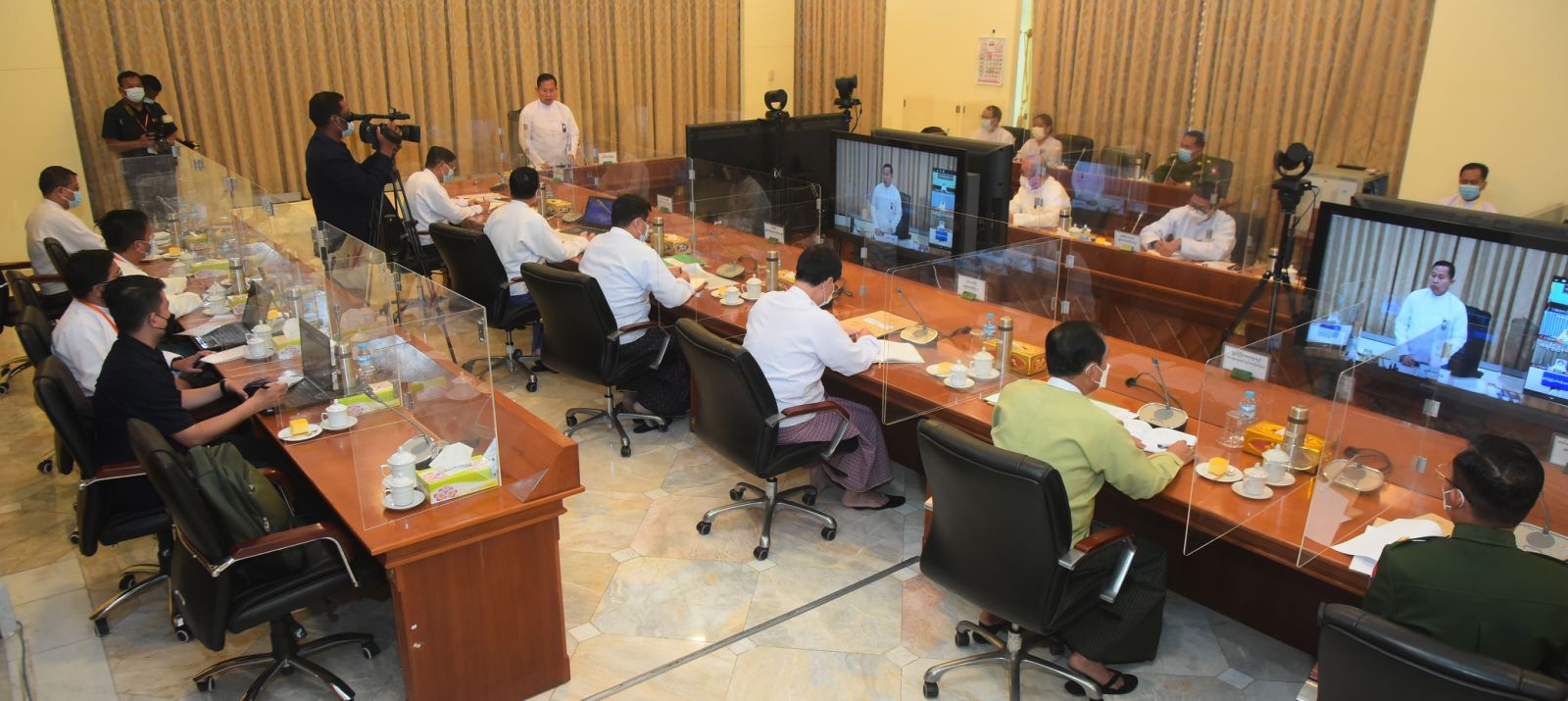
As the world continues to mouth hollow objections to the Myanmar military regime’s plan to hold an election next year, the junta is forging ahead, believing a vote will give it the legitimacy it seeks as the elected government of Myanmar, and obscure the memory of last year’s coup.
On Thursday, deputy junta chief Soe Win met the junta-appointed election body along with the regime’s ministers and deputy ministers at the office of the junta’s governing body, the State Administration Council, in Naypyitaw. He called on them to ensure next year’s planned vote is a success.
Soe Win also instructed the officials to compile voter lists with unerring accuracy. He repeated the regime’s allegation of voter list errors in the 2020 general election, which junta leader Min Aung Hlaing has cited as a justification for his coup.
Local electoral bodies in many townships across Myanmar have begun holding meetings to draw up voter lists, select venues for polling stations and procure voting materials.
In a statement to mark two years since the Nov. 8, 2020 election, the US State Department expressed serious doubts about the credibility of an election under the regime.
“We share [the pro-democracy movement’s] convictions that the regime’s planned sham ‘elections,’ which could not possibly be free and fair in the current context, will only fuel more violence, prolong the crisis, and defer the country’s transition to democracy and stability. We urge the international community to deny the military and its so-called ‘elections’ credibility and instead meaningfully engage with pro-democracy leaders who uphold a vision for an inclusive and prosperous Burma,” reads the statement, using another name for Myanmar.
The National League for Democracy, which won a majority in the 2020 election, also said it would not recognize the regime’s planned poll.
Economic ties with Russia continue to deepen
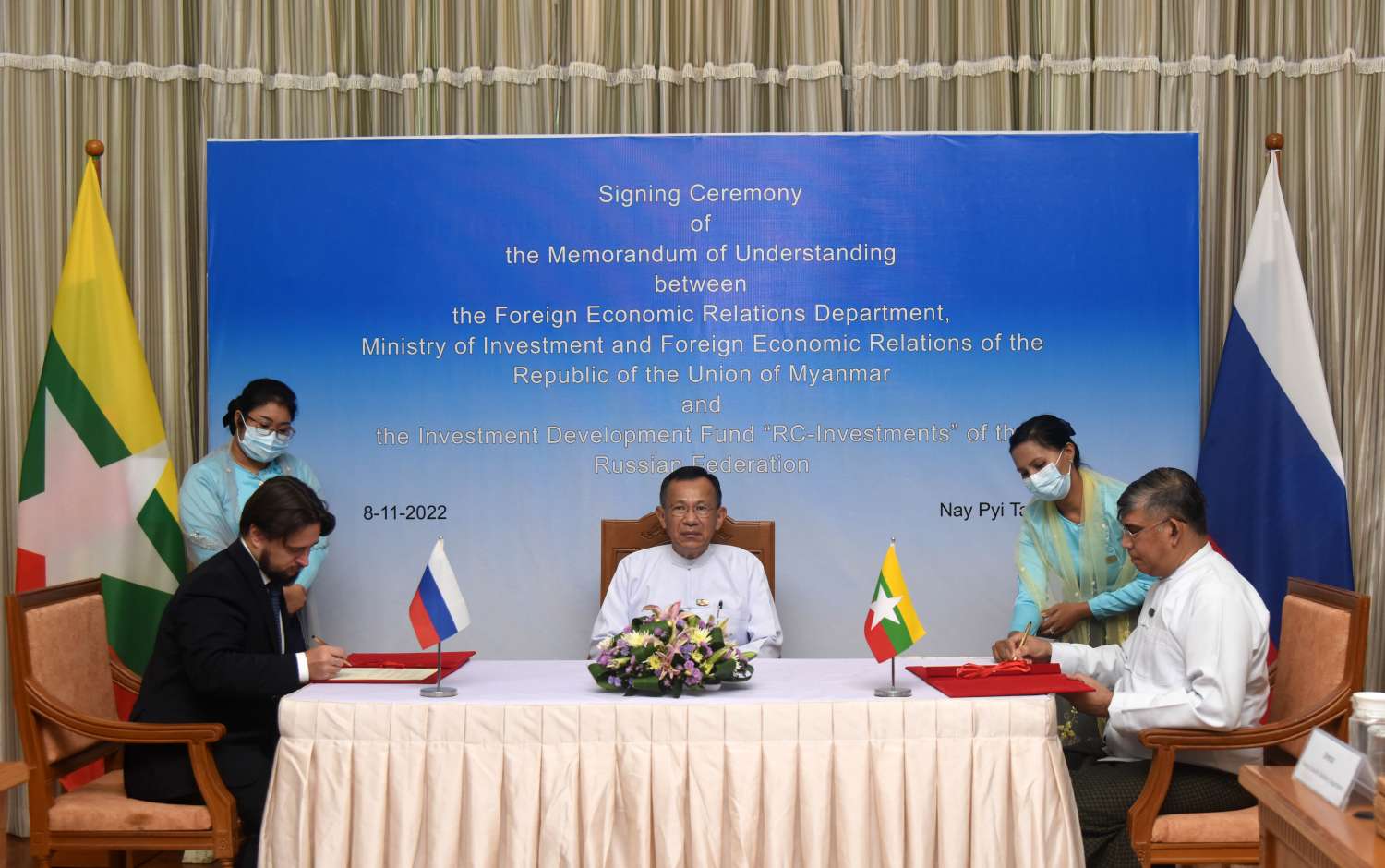
Junta-appointed Minister for Investment and Foreign Economic Relations Dr. Kan Zaw signed a memorandum of understanding on promoting trade and investment cooperation with Fund RC-Investments of Russia in Naypyitaw on Tuesday, the same day the man who has been facilitating foreign investments in Myanmar to finance the regime was sanctioned by the EU.
Dr. Kan Zaw and the Russian delegation discussed promotion of bilateral trade and investment, and cooperation in various sectors including tourism, agriculture, mining, industry, electricity, energy, culture and education, according to junta media.
The minister is among those who have helped junta chief Min Aung Hlaing find ways to fund his regime, which is facing a financial crisis due to international economic sanctions and a public boycot of payments of any kind to the regime since the coup.
The 68-year-old former economics university rector served as planning and finance minister in U Thein Sein’s quasi-civilian government, and was auditor-general in the aftermath of the coup.


